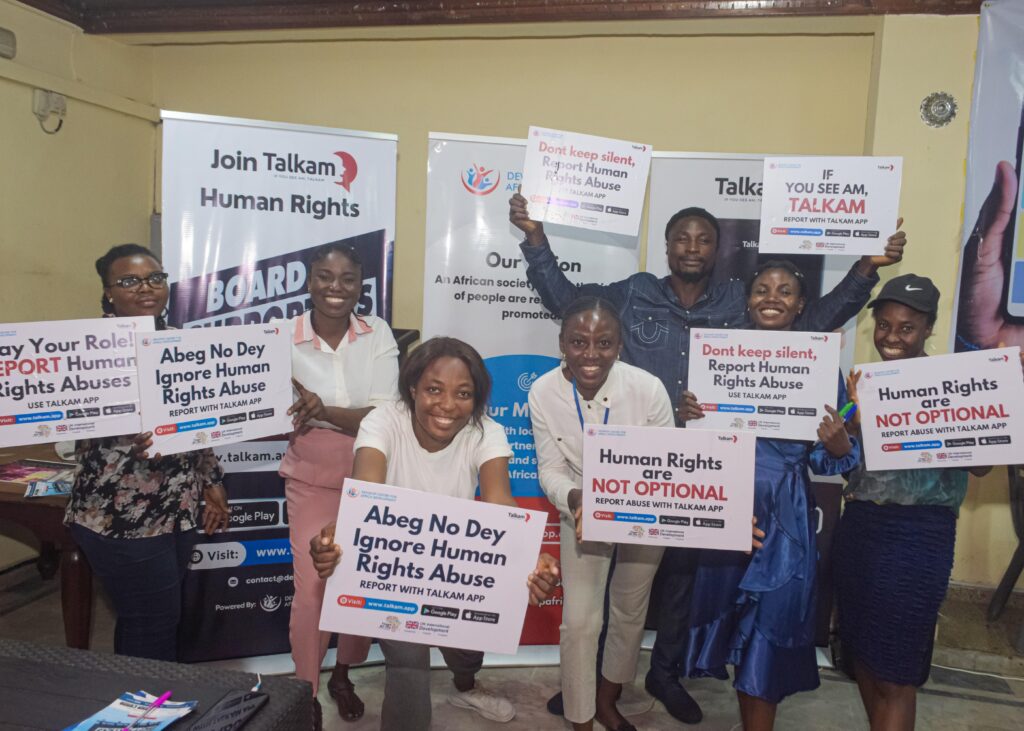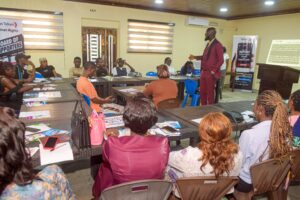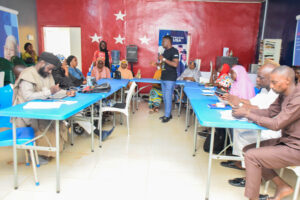DEVATOP Hosts Community Dialogues to Empower Communities in Lagos and Sokoto on Human Rights and Civic Engagement

As part of Devatop Centre for Africa Development’s ongoing mission to inspire civic engagement and protect vulnerable individuals across Nigeria, a Human Rights Civic Dialogue was held on the 10th of September in Lagos State uniting participants from three local government areas to discuss pressing matters of social justice, human rights, civic engagement, and accountability. The dialogue was aimed at equipping citizens with the tools and knowledge necessary to become active participants of change in their communities.
The event began with a welcoming speech by Noreen Abalaka, who outlined the day’s objective which was to empower the participants to make a tangible difference in their communities. Her words were followed by a goodwill message from Pastor Ayo Awesu, a respected community influencer, who stated the importance of grassroots efforts, emphasizing that even small actions can lead to significant societal changes.
 Further into the event of the day a presentation was made by Prince Ademola Adetola the Publicity Secretary, Parliamentary Staff Association of Nigeria, Lagos Chapter, who delved into the topics of human rights, social justice, accountability, and civic engagement. Ademola stressed that human rights are fundamental entitlements that every individual deserves, and social justice requires building systems that promote fairness for all, regardless of background. He urged participants to become champions for justice in their daily lives, highlighting the importance of civic engagement beyond merely voting or attending meetings. Participants were encouraged to report human rights abuses and educate others about their rights, leaving the session with not only knowledge but also a renewed sense of responsibility to act.
Further into the event of the day a presentation was made by Prince Ademola Adetola the Publicity Secretary, Parliamentary Staff Association of Nigeria, Lagos Chapter, who delved into the topics of human rights, social justice, accountability, and civic engagement. Ademola stressed that human rights are fundamental entitlements that every individual deserves, and social justice requires building systems that promote fairness for all, regardless of background. He urged participants to become champions for justice in their daily lives, highlighting the importance of civic engagement beyond merely voting or attending meetings. Participants were encouraged to report human rights abuses and educate others about their rights, leaving the session with not only knowledge but also a renewed sense of responsibility to act.
DEVATOP’s Executive Director, Mr. Joseph Osuigwe, delivered an inspirational message about the role of citizens in promoting human rights and social justice, emphasizing the critical need for civic engagement and accountability. He reminded the attendees that silence often enables human rights abuses and this served as a call to action, urging participants to use the TALKAM App and other available tools to stand against injustice and protect the vulnerable.
One of the key highlights of the dialogue was the TALKAM App demonstration, led by Janet Homo, DEVATOP’s Project Lead. Janet guided participants through the app’s features, displaying how it allows real-time reporting of human rights violations, thus making it an essential tool for promoting justice. Participants were shown how to download the app and were instructed to register and use the platform to monitor cases of human rights abuses reported and engage with government bodies.
Just days later, on September 13th, 2024, another community dialogue was held at the American Space, City Campus, Sokoto, where participants from various sectors such as civil society organizations (CSOs), community champions, case management workers, and various stakeholders came together to deepen their understanding of human rights and civic engagement. The dialogue provided a platform for participants to gain practical strategies for addressing human rights violations and fostering accountability.
 Mr. Ameh Jerry, the Secretary of the National Agency for the Prohibition of Trafficking in Persons, delivered an insightful presentation on the core themes of human rights, social justice, and civic engagement. A live demonstration of the TALKAM App, led by Mr. Matthew Sunday A., further emphasized its role as a critical tool in reporting and addressing human rights abuses. Participants were once again encouraged to download and use the app in their communities, and by the end of the event, all participants had committed to promoting it within their networks.
Mr. Ameh Jerry, the Secretary of the National Agency for the Prohibition of Trafficking in Persons, delivered an insightful presentation on the core themes of human rights, social justice, and civic engagement. A live demonstration of the TALKAM App, led by Mr. Matthew Sunday A., further emphasized its role as a critical tool in reporting and addressing human rights abuses. Participants were once again encouraged to download and use the app in their communities, and by the end of the event, all participants had committed to promoting it within their networks.
By the end of the dialogue, participants had not only gained a deeper understanding of their roles in promoting human rights but also committed to using the Talkam App to report abuses and continue educating their communities. Stakeholders made pledges to advocate for human rights within their communities, from sensitizing students to educating people with disabilities on their rights.
Both events were successful, leaving participants inspired and equipped with practical knowledge to take immediate action in their communities.
